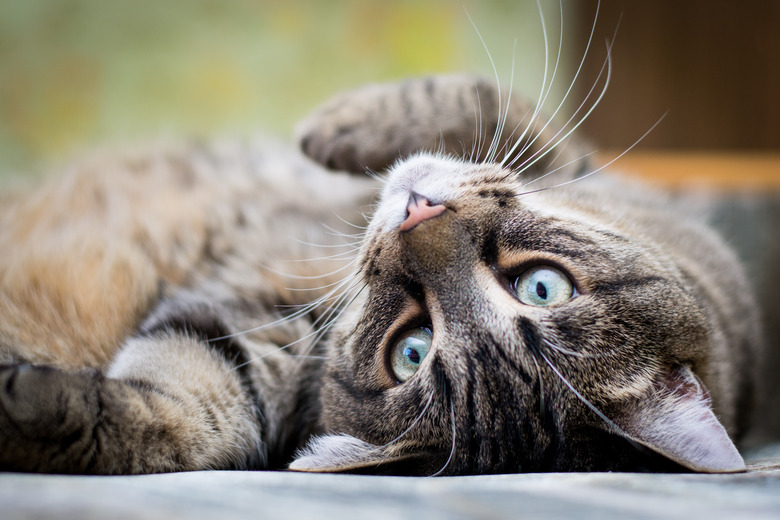How To Get Rid Of Male Cat Spray
There's so much to love about cats — those cute faces, the affectionate demeanors, and each one's individual charming personality are all more than enough reason to compromise space on your phone for a million photos of feline friends. Some things, however, aren't so cute, like spraying.
Male cats spray to mark their territories and let lady cats know that they're ready for action, which often unfortunately results in ruined carpeting and upholstered surfaces inside the house. Although getting rid of cat spray is certainly annoying, it can be done easily in a few simple steps.
Enzymatic cleaner for cat urine
Enzymatic cleaner for cat urine
Whatever method you choose to rid your home of cat spray smell, you'll first want to prep the area. If the pee stain you're treating is fresh, start by soaking up as much of the liquid as you can with a clean towel before rinsing the area with cool water. Next, clean the area with an enzymatic cleaner for cat urine to kill the odor-causing bacteria, according to Good Housekeeping. There are several enzyme-based cleaners on the market designed to treat cat spray specifically.
To treat male cat spray with an enzymatic cleanser, simply spray the affected area. Then, blot it with a damp towel until as much of the spray and liquid you are able to lift are removed. Next, cover the area with a clean damp towel and let it sit overnight. This method can be used on fabric materials like carpeting and upholstery.
Easy-to-clean surfaces like wood or tile can simply be wiped clean before spraying with a cleanser — just be sure to get to messes as quickly as possible to avoid possible staining or discoloration.
DIY solutions for spraying
DIY solutions for spraying
If you're seeking more cost-effective measures to rid your home of cat spray, deodorizing experts Arm & Hammer offer a few simple solutions. To treat machine washable materials, like clothing or bedding, add 1/4 cup of apple cider vinegar and a generous sprinkling of baking soda to your usual laundry detergent and wash fabrics in this mixture. You can also opt for a detergent with baking soda to deodorize urine-sprayed clothing.
Flooring surfaces can also be treated with products from home, but the formula will depend on the type of material you're treating. Carpeting with fresh urine stains can be sprinkled with baking soda after blotting and rinsing with water. Allow the baking soda to absorb any liquids and dry before vacuuming everything up. To treat hard surfaces, like wood, tile, or linoleum, absorb as much of the urine as possible before mopping the area with a solution of one part bleach to seven parts water.
Preventative measures
Preventative measures
If ridding a room, bedding, or your yard of that cat spray smell is something you deal with often, or just hope to never deal with again, then the best tip for keeping a scent-free living area is to implement preventative measures. If you have a cat that's spraying indoors, The Humane Society recommends cleaning his litter box regularly to encourage proper use, since some cats won't use a box if it's too dirty.
If your cat frequently sprays the same place, you'll want to do your best to prevent him from reaching that area by using baby gates or other barriers, if possible. If chronic spraying is an issue you're facing, check with your veterinarian to rule out any medical issues that may be leading to a lack of bladder control, like a urinary tract infection.
If your indoor cat isn't causing you trouble, you may be asking yourself, "How can I stop cats from spraying in my yard?" Because cats are territorial animals they will mark areas that they deem as theirs, so unfortunately, you won't be able to fully stop cats from spraying outdoors, even your own.
To keep strays or neighbor cats from peeing around your yard or home, you can try setting up motion-detected lights to scare them off when they reach your property or litter the premises with unpleasant scents, like orange peels, eucalyptus oil, or lavender. If your cat is spraying your own lawn, you can try making things uncomfortable by placing chicken wire or other rough surfaces on the ground, which they should avoid.
